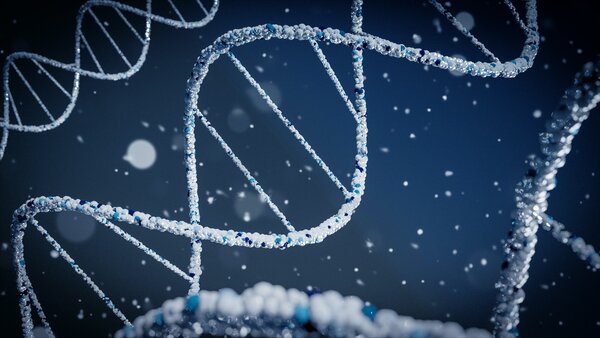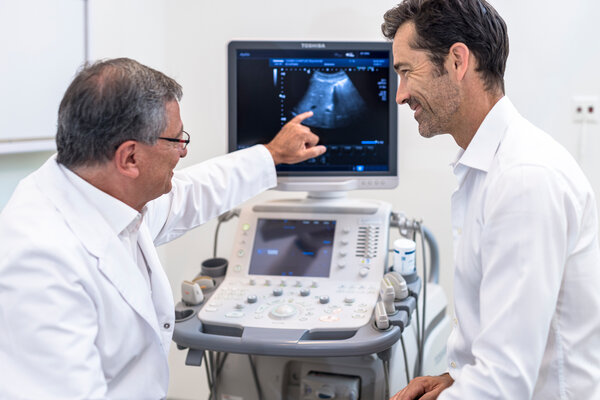Eat well. Exercise. Reduce stress. Get plenty of sleep.
We all know the basic steps for healthy living, but did you know that these beneficial habits (and their detrimental inverses) can impact your very genetic code?
Gaining in prominence and recognition since the 1990s, epigenetics is a relatively new field of biology that studies the effects our environment and lifestyle choices have on the expression of our inherited genes, as well as the ways in which we can harness these mechanisms to the betterment of our health.
In other words, how our behaviour may be able to help us break free of our genetic destiny.

"Every single cell in our body encloses the same genetic information, a complete and unique blueprint that builds the individual," explains Sonia Spring, global marketing director at Clinique La Prairie in Montreux, Switzerland, which is pioneering the use of epigenetics in preventative and anti-ageing treatments.
"What differentiates a brain cell from a liver cell – or any other cell – is the activation and inactivation of specific genes. Epigenetics refers to that: the science and mechanisms that switch genes on and off. Every factor of our life and lifestyle is directly impacting our epigenetic landscape, and may give signals to our genes to activate positive or negative processes into our body. So when we eat healthily, we stop smoking or we regularly practise physical activity, we are actually triggering positive epigenetic mechanisms for our health."
You may not be able to change your genetic code, but you can influence whether certain genes are expressed or repressed – and in doing so improve your overall health.
 Photo: Clinique La Prairie
Photo: Clinique La Prairie
We tend to think of food as pleasure – and it is! – but first and foremost food is fuel, powering every process in our bodies. As such, when looking to apply epigenetic findings to your own pursuit of better health, nutrition is the best place to start.
According to Dr Vicente Mera, head of the Genomic Medicine and Healthy Ageing Unit at SHA Wellness Clinic on Spain's Costa Blanca, "Our body composition is written in our genes, but it is up to us to change it through our diet. Overweight people often come from families predisposed to being overweight. But this genetic tendency can be reversed with healthy, balanced nutrition. In fact, we know that certain foods have a high potential for epigenetic transformation and can prevent processes that accelerate cellular senescence, such as oxidation and glycation, or enhance autophagy [the natural regeneration of cells]."
 Photo: Shamadi Restaurant at SHA Wellness Clinic
Photo: Shamadi Restaurant at SHA Wellness Clinic
Reaching for anti-inflammatory, antioxidant-rich whole foods such as fruits, vegetables, legumes, nuts, seeds and whole grains, rather than processed products that have been stripped of their nutrients or pumped full of sugars, preservatives and other additives, is a basic tenet of positive epigenetic eating.
However, Dr Adrian Heini, medical director at Clinique La Prairie, recommends monitoring not only what you eat, but how you eat: "Changing food habits is about the pleasure of eating, while reducing food volume and caloric ingestion. One easy and smart tip: to be in better health, chew! When you chew well, you swallow more slowly and all the taste, sensory and nutritional information is better perceived in the upper spheres of the brain. Result: the brain better receives the signal 'I have my dose of energy' – and it delivers a satiety message after about 20 minutes. When, on the contrary, we gobble our food, the brain is bypassed in favour of the stomach."
Indeed, 'mind over matter' is a useful mantra when taking an epigenetic approach to health, especially in the management of one of modern life’s most insidious fixtures: stress.
"Stress in our lives translates into oxidative stress, which is a condition that occurs when there is an excess of free radicals produced during metabolic processes in the body’s cells," warns Dr Heini. "The imbalance between free radicals and antioxidants plays a significant role in ageing, causing changes in proteins, lipids and DNA. If we generate too much or chronic oxidative stress, over time, this triggers chronic inflammation with serious impact on the immune system and cellular senescence, because these physiological stresses are stored all over in our body and prevent the normal functioning of many bodily systems."
To combat stress and its havoc-wreaking effects on our physical wellbeing, both Dr Heini and Dr Mera recommend practising mindfulness and mind-body techniques that exert a calming influence, such as meditation, yoga and breathing exercises.
"Although these are mental techniques," Dr Heini elaborates, "they trigger a unique neurophysiological state. They help in generating a state of profound rest that, with regular practise, develops into a sort of personal shield – a source of protection created within you that helps you counter the body’s stress response when you need it."
 Photo: Clinique La Prairie
Photo: Clinique La Prairie
When setting out to apply epigenetic science to your daily life – as with any new health regimen – seeking expert advice and guidance is highly advised. And what better place to find that advice than under the 24-hour care of top medical professionals at some of the world's most restorative spas?
At SHA Wellness Clinic, for example, Dr Mera and his team in the Anti-Ageing and Regenerative Medicine Units are using genetic tests and newly developed diagnostics for a wide range of health objectives, from minimising the problems of menopause and andropause to helping clients quit smoking, correct nutrient deficiencies, improve their emotional response to stress and adverse situations, and find the ideal athletic activities to suit their lung capacity and resistance.
Meanwhile, under the direction of Dr Heini, the longevity doctors at Clinique La Prairie use a complex patented process to analyse clients' DNA, revealing their biological age and epigenetic factors in order to recommend medical interventions and lifestyle changes for optimal health. These results are also used to inform a holistic approach that encompasses nutrition, movement, stress management and medical insights.
"After a week with our physicians and holistic therapists," he says, "you apprehend the link between your lifestyle, your DNA, your epigenetic profile and your risk factors, and you know how to trigger the best lifestyle change for a fuller life."
© 2025 JI Lifestyle GmbH. All rights reserved.